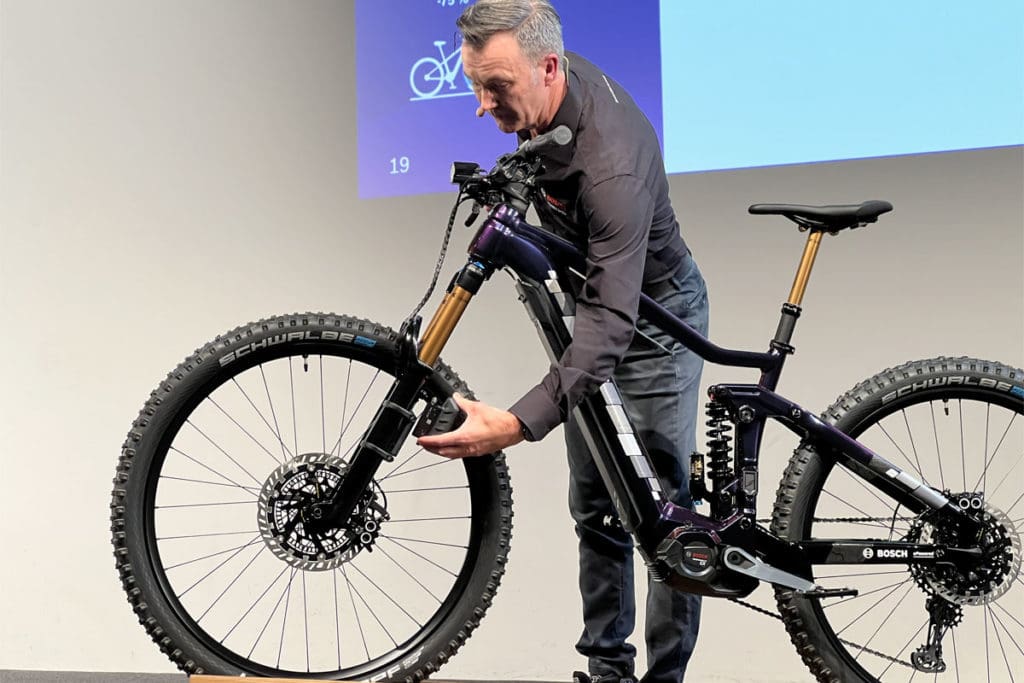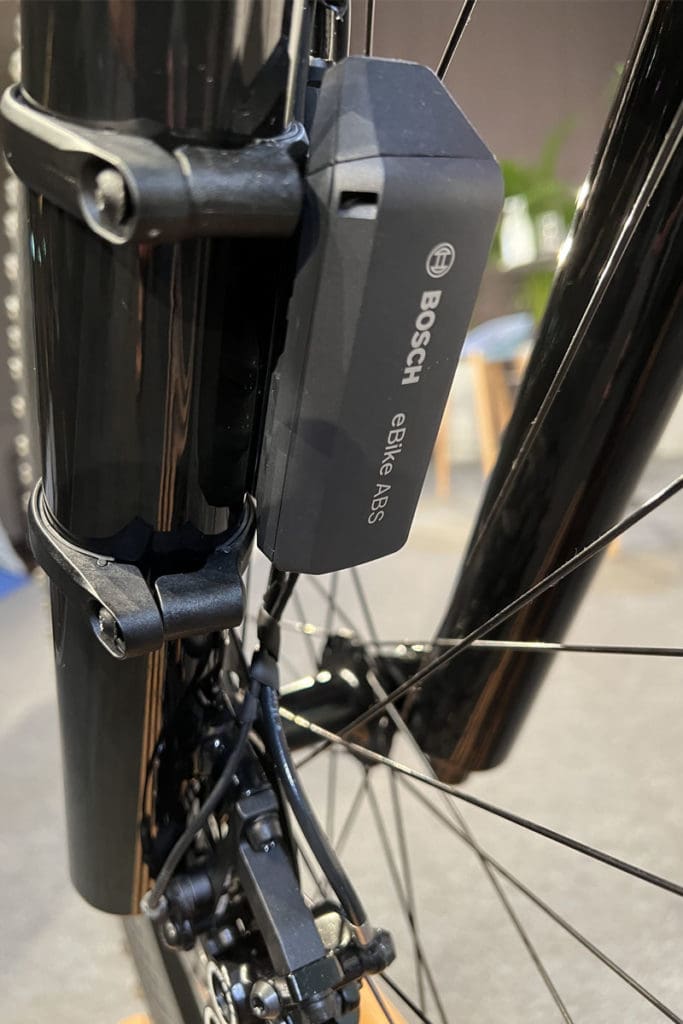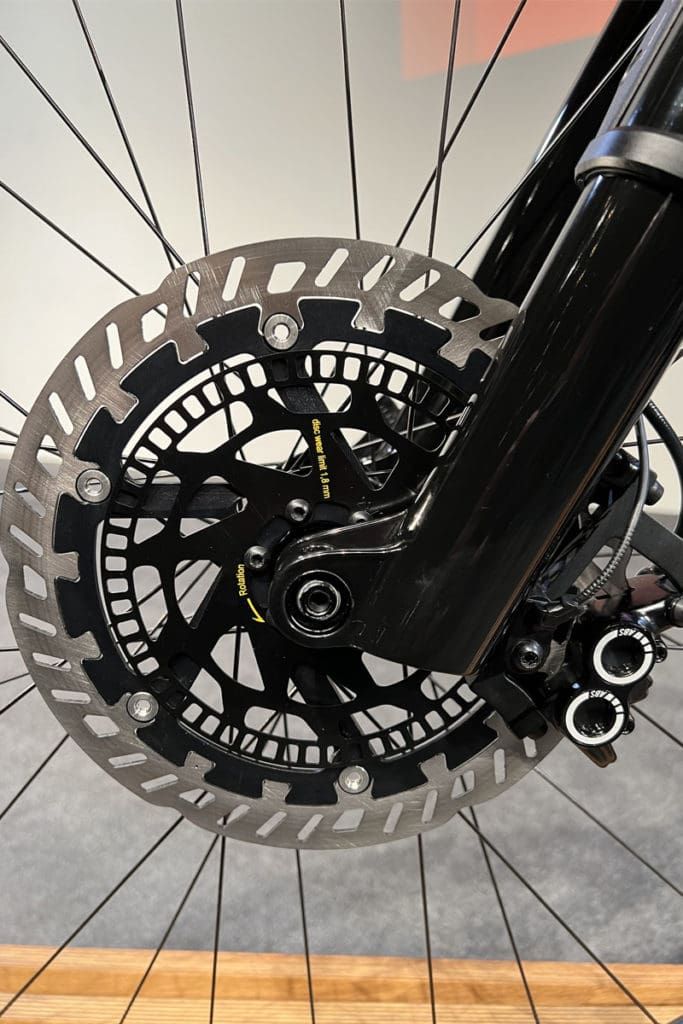Bosch Takes the Brakes Off

Frankfurt, Germany
Despite there being plenty of available function rooms at Messe Frankfurt, Bosch chose to hire a more character-filled hall on the other side of the city for its 2023 season launch.
Ironically, the bus sent to collect members of the media from Messe Frankfurt (as the showgrounds that now host Eurobike are called) and drive them across town ran late, due to heavy motor traffic and narrow roads making it slow going for a full-sized coach. Perhaps they should despatch a fleet of Bosch equipped e-bikes next year.
Arriving at the hall, Bosch E-Bike Systems’ global CEO Claus Fleischer was already on stage accompanied by a host. Before they got into Bosch product specifics, Claus started with some bigger picture data.
He showed a chart comparing the usage per kilometre of CO2 (carbon dioxide, often referred to as greenhouse gas) of a non-electric bicycle, at zero grams, to an e-bike, at four grams, to an e-car, at 67 grams, to an internal combustion engine (ICE) car, at 136 grams.
“If you take the CO2 per kilometre for an ebike and you just cycle for seven weeks, 10 kilometres per day, you’ve already compensated for the battery production, by not using your car for that distance,” he stated.
Comparing the lifetime carbon footprint of these four modes in kilograms of CO2 was even more dramatic. 133kg for the bicycle, 360 kg for the e-bike, 27,000 kg for the e-car and 34,150 kg for the ICE car.
Next, Claus moved onto some market statistics. “This was for sure a boom year,” he said, making brief mention of market growth in Australia and New Zealand as part of a summary of certain markets.
Then he moved onto the vexed topic of supply shortages. “Last year it was mainly mechanical components coming out of Asia,” he recalled, before summarising that while that shortage is now easing, there is more pain ahead when it comes to electronic components.
“The electronics situation is still critical for two reasons which are important to understand,” he said.
“Firstly, there is a global, structural shortage when it comes to electronics supply compared to demand. This includes automotive, motorbikes and e-bikes. To build new production facilities takes three to four years.
“Secondly, we’re still coming out of Covid lockdowns. We still have lockdowns like Shanghai in China. You cannot control production anymore.”
Claus said Bosch was working very hard to minimise disruption of supply of its e-bike products in this challenging environment.

What’s New for 2023
If you had to summarise the key developments that we’ll be seeing on Bosch-equipped bikes in 2023 in a word, it would be ‘electronics’.
Advanced electronics are central to the three biggest new features Bosch was highlighting: further refinements to their ‘Smart System’ that they first launched last year, anti-theft systems and a new generation of anti-lock braking.
One example is Bosch’s Auto Mode, which can sense if you’re riding uphill or into a headwind and automatically increases the level of power assist.
Claus then ran through a number of upgrades to motors and batteries before moving on to what he claimed was the world’s smallest anti-lock brake system (ABS) for bicycles.
“Safety is a huge issue. Unexpected situations can happen,” he said in explaining their motivation for developing the new system. According to Bosch research, 29% of bike accidents could be prevented with ABS.
Bosch first launched ABS several years ago but the new system is 77% smaller, 55% lighter and comes in different modes for different types of bikes and requirements, specifically cargo, touring, all road and trail. The system was developed in partnership with Magura and for now at least is only compatible with Magura brakes.
“Bosch has more than 40 years’ experience with ABS for cars, more than 25 years’ experience with ABS for motorbikes and since 2018 ABS for e-bikes,” Claus said. He talked about how bicycles have a higher centre of gravity compared to the other two modes, because the bicycle itself is so light compared to the rider and the system’s detection of the rear wheel lifting if the rider is potentially about to go over the handlebars.
We were promised the opportunity to test the new ABS at the end of the formal presentation, but next it was time to talk about theft protection.
With Bosch’s new e-bike alarm, the first time the bike is moved it lets off a small, fast beep. If it’s moved further the alarm changes to a louder, more insistent tone. If the thief persists, the bike is tracked with push notification to the owner’s smartphone so they can inform the police of the bike’s location.

After information on new controllers and app upgrades, it was time for test riding.
They had a couple of gravel skid pads set up in the middle of an asphalt car park and a range of different bikes to try. I gave the brakes a few test runs and it certainly worked effectively. Riding flat out into the gravel and jamming on the hydraulic disk front brake alone would normally be a recipe for a certain front wheel lock-up. But it was impossible to make the wheel lock no matter how suddenly or strongly I applied the brake. There was delay or no pulsing sensation that I could detect, no noises or shuddering. The brakes simply worked powerfully without skidding.
It’s clear to see that Bosch is making the most of its long history in automotive electronics, not just with ABS, but in new control unit displays and other electronic features.
It’s going to be hard for specialist bicycle component companies to compete by developing their own in-house electronic expertise and systems. Perhaps we’ll see them collaborating more with electronic specialists.
Whatever the competitors do, Bosch has clearly raised the stakes when it comes to using electronics to enhance cycling safety, security and amenity.
